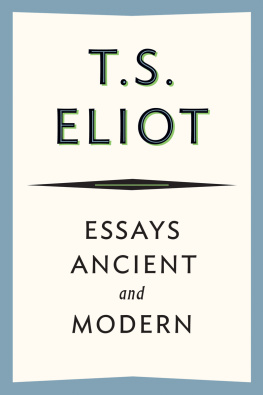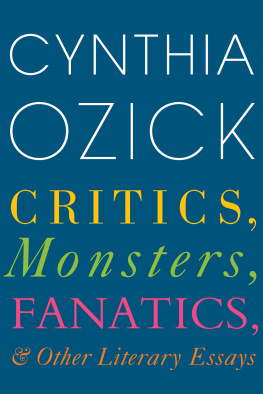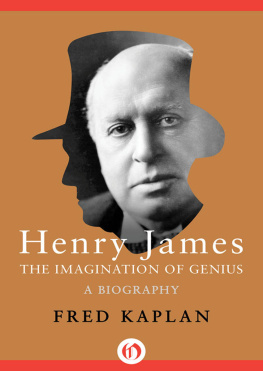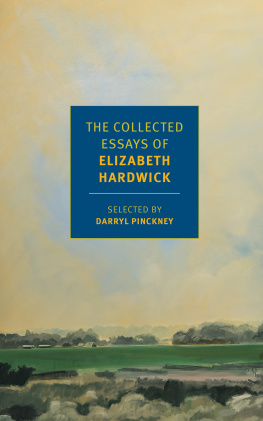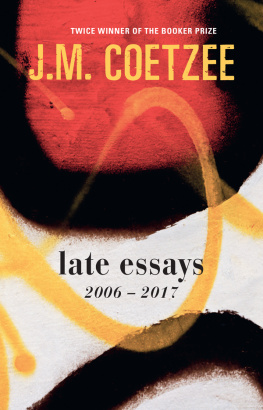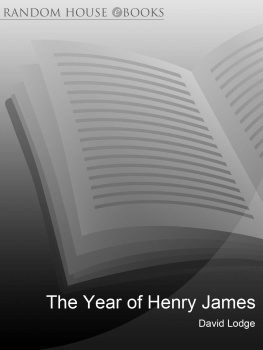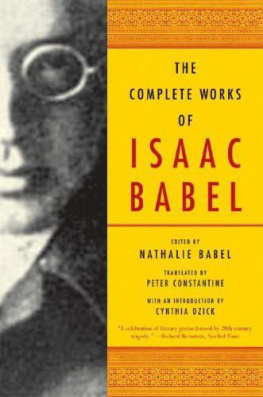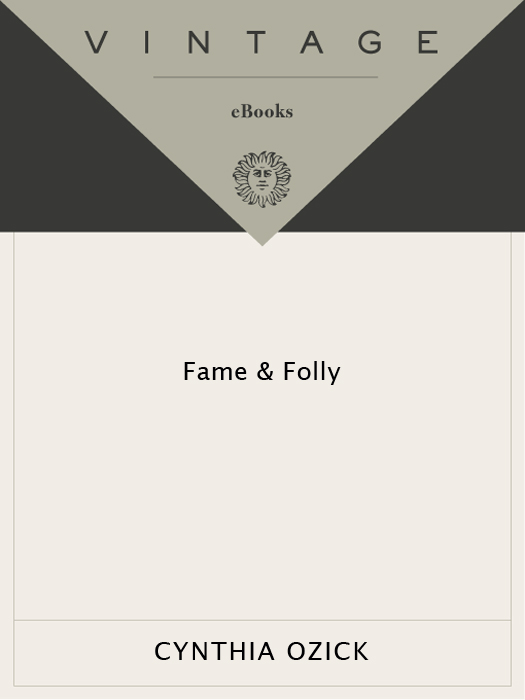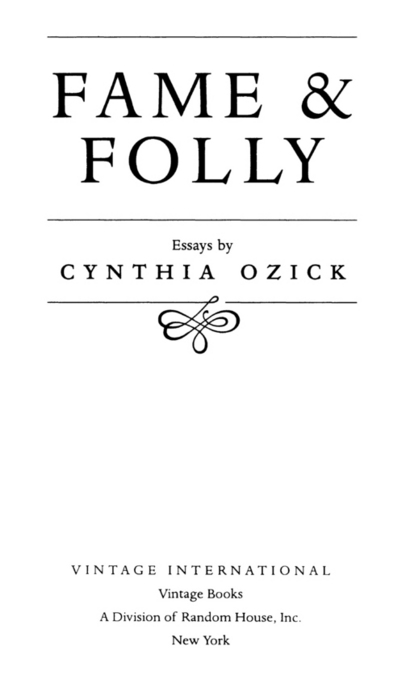ACCLAIM FOR CYNTHIA OZICKs
FAME & FOLLY
[Ozicks arguments] twist and turn, digress, slow down and speed up, surprise with sudden illuminations. She likes to spin and sparkle. Insight, feeling, and the writers art come together.
The New York Times Book Review
Pulse-quickening impassioned a Roman candle of well-turned phrases.
Wall Street Journal
Brilliant and beguiling.
Los Angeles Times
Her essays invite our admiration even as they challenge us to talk back.
Newsweek
No one turns a phrase the way [Ozick] does, blending the perfect verve of Henry James with the wisecracking mournfulness of Jewish New York note-perfect.
Portland Oregonian
ALSO BY CYNTHIA OZICK
Trust
The Pagan Rabbi and Other Stories
Bloodshed and Three Novellas
Levitation: Five Fictions
Art & Ardor: Essays
The Cannibal Galaxy
The Messiah of Stockholm
Metaphor & Memory: Essays
The Shawl
CYNTHIA OZICK
FAME & FOLLY
Cynthia Ozicks essays, novels, and short stories have won numerous prizes and awards, including the American Academy of Arts and Letters Straus Living Award, four O. Henry First Prizes, the Rea Award for the Short Story, and a Guggenheim Fellowship. Her work has been translated into most major languages. She lives in Westchester County, New York, and recently ventured into playwriting with an adaptation of her own The Shawl.


FIRST VINTAGE INTERNATIONAL EDITION, JUNE 1997
Copyright 1996 by Cynthia Ozick
All rights reserved under International and Pan-American Copyright Conventions. Published in the United States by Vintage Books, a division of Random House, Inc., New York, and simultaneously in Canada by Random House of Canada Limited, Toronto. Originally published in the United States in hardcover by Alfred A. Knopf, Inc., New York, in 1996.
Most of the essays in this collection were originally published in American Poetry Review, Antaeus, Commentary, The New Criterion, The New Republic, The New York Times Book Review, The New Yorker, Partisan Review, and The Washington Post Book Review.
Alfred Chesters Wig, Rushdie in the Louvre, and The Break were chosen for Best American Essays 1993, 1994, and 1995.
Annals of the Temple is a chapter from the forthcoming A Century of Arts and Letters, a history of the American Academy of Arts and Letters to be published by Columbia University Press.
Owing to limitations of space, all permissions to reprint previously published material can be found on .
The Library of Congress has cataloged the Knopf edition as follows:
Ozick, Cynthia.
Fame & folly: essays / by Cynthia Ozick. 1st ed.
p. cm.
1. American literatureHistory and criticism.
2. English literatureHistory and criticism. I. Title.
PS121.096 1996
810.9dc20 95-44429
eISBN: 978-0-307-80790-8
Random House Web address: http://www.randomhouse.com/
v3.1
For Rachel (again),
for Alex,
and for Samuel Joseph
Contents
Foreword
The impartial Law enrolled a name
For my especial use:
My rights in it would rest the same
Whether I puffed it into fame
Or sank it in abuse.
Robert Graves, My Name and I
N O PREFACES , someone admonished me long ago, and he may have been right, though Im not exactly sure how or why. Is it because of what the lawyers say: res ipsa loquiturwhatever the thing is, let it speak for itself? Or because prefaces and introductions can be mistaken for a summary of a books contents, or, worse yet, for a writers credoeither one of which is guaranteed to irritate, the capsule for being superfluous, the credo for being grandiose?
So that is why this collection of mostly literary pieces comes without an introduction (which is usually one more essay pretending not to be) and without a preface (pretty much the same thing as an introduction). I hope Foreword will suggest something a lot more modestat any rate, nothing so tyrannical as a Procrustean bed, to which a volumes wandering touchstones must be made to conform. (That notorious Greek bed, by the way, turns up in Jewish legend, too: its precisely the kind of hospitality the burghers of Sodom are said to have offered their guests, and is probably the real meaning of sodomy.)
The point, then, of these words positioned before all the other words herein (and written afterward, it goes without saying) is only to muse a little on the title of this book. And I trust the point wont be too pointed, and will allow some leeway for a drizzle of uncertainty; it may be that Robert Graves, in the epigraph above, has done all the musing necessary on the subject of fame and folly. My name will take less thought for me, he concludes in a later stanza, In worlds of men I cannot see, / Than ever I for him. The assumption is the persistence of the poets famethat it will be known to posteritywhether or not it is connected with (damaged by) folly. Graves may have been too sanguine about the fate of his repute; for some (though not for me), especially for those who are a generation or two distant, he has already passed into that immense and glorious company of the Ephemeral. No noteworthy wickedness attaches to him; unlike some other poets even more illustrious, and more durable, Graves never labored toward sinking his name in abuse.
The list of famous literary figures in our famously rotten century who have been associated with one sort of folly or another is long enough without him. And yet certain of their names outlive, and outshine, their folly. Ezra Pound was incontrovertibly insane, but the form his madness chose (he might have gone harmlessly chasing butterflies, or posed as a Chinese sage) is a lasting stain on civilization. Posteritythat means usappears to overlook the stain. Heidegger as philosopher outlives and outshines Heidegger as dedicated Nazi. T. S. Eliot (who takes my concentrated gaze in these pages) is less remembered for bigotry and an attraction to fascism than for his position as modernist poet-prophet. And not all of this amnesiavery little, in factis owed to what we may be tempted to call whitewash. Isaac Babel, murdered by the iron-hearted utopian regime he had himself subscribed to, began by carrying the whitewash in his own pail. More recently, a prominent writer of the former German Democratic Republic, celebrated by the West as a dissident, did, after all, know what she was doing when she informed for the secret police.
There is the folly from within and the folly from without. The difference is sometimes hard to see. Even the clarity of Salman Rushdies conditiona terrorist threat by external forces whose aims are plainly and fanatically extra-literaryis blurred by his earlier record of silence concerning any Middle Eastern terror that claimed to be anti-imperialist. But such ironies are not to be relished by anyone; chiefly, I forbid them to myself. That stone-throwers may themselves occasionally vacation in glass houses is disappointing but unsurprising. Mark Twain, scourge of human folly, excoriator of bigots and their canards, himself committed an essay (I discuss it here) that reproduces some malicious old canards. It hurts, but never mind: he remains the radiant Mark Twaina bit blemished. And Rushdie, heroic and combative in his denunciation of terror, has left all blemish behind.


